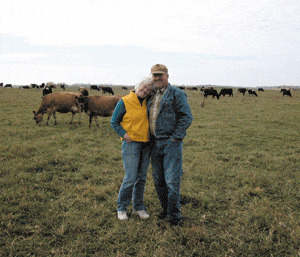Star Tribune
by Emma Nelson
 Cedar Summit Farms is closing after winning a suit requiring that utilities buy farmland.
Cedar Summit Farms is closing after winning a suit requiring that utilities buy farmland.
Cedar Summit Farm, a family-run dairy famous for its creamy organic milk from grass-fed cows, is closing.
The Minar family, which farmed the land in New Prague since 1926, had been locked in a lawsuit with a utilities coalition that planted power lines across their dairy farm. The Minars argued the CapX2020 power lines would ruin the dairy, and in August a judge said the utilities coalition needed to buy the whole farm if the Minars wanted out.
Other farms along the power line had been watching the case and may follow suit, invoking Minnesota’s “Buy the Farm” law.
“Everybody kind of waited to see what happened with the Minars’ farm,” said Thom Petersen, director of government relations for the Minnesota Farmers Union.
The closure was announced Jan. 9 with a message on the farm’s website.
“It is with a heavy heart that we inform you that Cedar Summit Farm will cease production of our dairy products on Friday, January 16, 2015,” the message read. “Our farm store will continue operation through January 31, 2015, though we may run out of milk earlier.”
Dave and Florence Minar, the farm’s current owners, declined to comment.
The Minars turned to Minnesota’s “Buy the Farm” law when they realized part of the $2 billion CapX2020 power line would cross Cedar Summit Farm. The law holds that when utilities want to push through a farm, and would threaten the farm’s existence, they must buy the land if the owner wants to sell.
The coalition of utilities behind CapX2020 argued that the law didn’t apply because their transmission structure would take up less than an acre. But the August ruling said “Buy the Farm” does apply because the power line’s presence affects the whole property, which has an estimated value of $1.4 million.
In a statement, CapX2020 said it had “negotiated a resolution to all issues related to the [Minar] family’s ‘Buy-the-Farm’ election.”
Statements from both CapX2020 and Cedar Summit Farm mentioned the possibility of relocating and continuing to produce dairy products. In the meantime, the farm will continue to sell beef.
Cedar Summit Farm dairy products are sold from nearly 75 locations, their thick glass bottles standing out in supermarket dairy cases.
Marshall Paulsen, head chef at Minneapolis’ Birchwood Cafe, said the restaurant has used the cream-topped, organic milk for years.
The Birchwood has been having trouble sourcing organic dairy products in general, he said. Other dairies around the Midwest have cut back on products, or have struggled with sourcing.
“I think it’s so hard for organic dairy farmers,” he said. “For the expenses they have to incur to stay organic, it just leaves so little room for product.”
For the Minars, the challenge of running an organic dairy — and maintaining the integrity of their product — was exacerbated by the presence of a 345,000-volt power line. Dairy farmers have raised concerns about stray voltage harming livestock.
The August ruling was seen as a victory for small farmers, setting a precedent that would allow them to negotiate with power companies. But it wasn’t clear if and when the Minars would sell their land
Farmers weigh options
Julie and Dale Schwartz live on a dairy farm near Arlington, Minn., that’s also crossed by the CapX2020 line. They’re hoping for a resolution similar to what happened at Cedar Summit Farm.
Petersen, of the Minnesota Farmers Union, said all of the affected farmers he’s talked to want to relocate and keep farming, but it can be tough to find the land for it.
“It’s hard to find a farm,” he said. “I think they all want to replicate the operation they have currently.”
The Schwartzes know they’re going to leave, but aren’t sure where they’ll go or what they’ll do if they can’t find another dairy farm.
“We’re in our 50s,” Julie Schwartz said, “so it’s not like we can retire.”
For some farmers, an answer is even further away. The “Buy the Farm” law only applies to land crossed by power lines, and some are questioning why it isn’t broader, Petersen said. What about farms with pipelines crawling beneath them? What about the fields eaten up by wastewater ponds?
“I can’t tell you how many calls I’ve gotten with … people saying, ‘Why can’t we have ‘Buy the Farm’ for this or that?’ ” he said.
Staff writer Karen Zamora contributed to this report.
Emma Nelson • 952-746-3287

